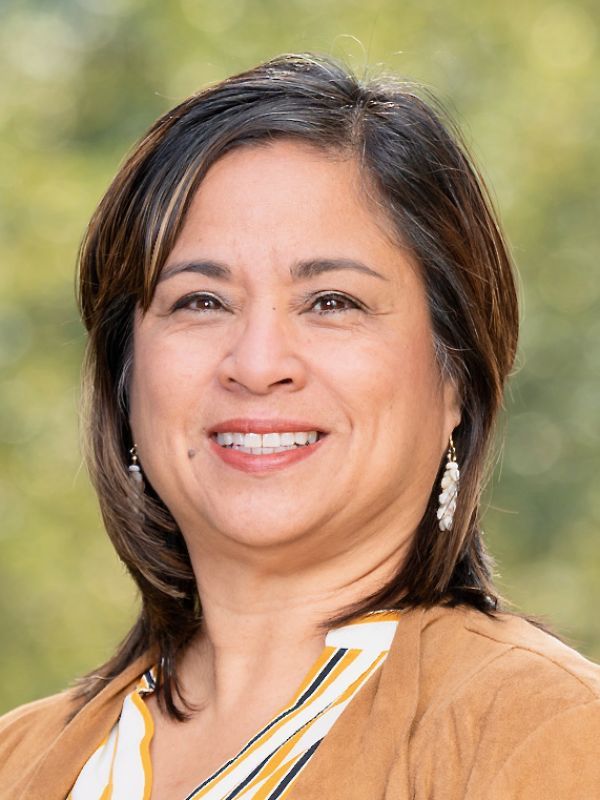
Alicia Rabena-Amen
Alicia Rabena-Amen, PT, DPT received a bachelor of science in biology and a master of science in physical therapy from Mount St. Mary's College in Los Angeles. She earned a transitional doctor of physical therapy from Arcadia University in Glenside, Pennsylvania. She has extensive experience as a physical therapist in home health and acute care settings.
Dr. Rabena-Amen is committed to playing a role in advancing the profession of physical therapy. She welcomed the opportunity to join the Pacific family because it allows her to give back to the profession through participating in the education of student physical therapists. Pacific also allows her to give back to her community through various outreach programs. Her goals are to increase student involvement in research and service learning activities in the community.
She is an active member of the Northern California Clinical Education Consortium, and she is also a trainer for the Credentialed Clinical Instructor Program.
Dr. Rabena-Amen is a member of the California chapter of the American Physical Therapy Association. Since 2014, she has served as a board member for the Physical Therapy Board of California. Since 2015, she has served on as a volunteer on various committees and taskforces for the Federation of State Boards of Physical Therapy.
She is actively involved in St. Michael's Catholic Church in Stockton. She enjoys reading, spending time with her husband and three sons and watching her youngest son play competitive basketball.
BS in Biology, Mount St. Mary's College, 1995
MS in Physical Therapy, Mount St. Mary's College, 1998
DPT, Arcadia University, 2017
"I look at teaching as both a responsibility and a privilege. I believe teaching should be viewed this way before ever arriving at the classroom door. Owning the sense of responsibility of teaching is critical. As a professor, I must truly grasp and feel the weight of teaching and mentoring the future clinicians of our wonderful profession of physical therapy. It is also important to appreciate the opportunity to be in such a position. By teaching with a sense of responsibility and gratitude, I can give students the best I have to offer."
"My research interests primarily lie in the behavioral science theories and methods arena."
Research Interests:
- Behavioral science theories and methods for cultural diversity in our profession or for attracting a more diverse applicant pool to physical therapy programs
- Descriptive studies regarding clinical education
- Clinical reasoning methods
- Student engagement using reflection exercises and cognitive wrappers
Research Statement:
Cultural diversity and equal opportunity have always been an area of passion for me. The U.S. is made up of a multitude of ethnicities and subcultures that enrich and beautify our country. The underrepresentation of diverse cultures in the field of physical therapy has always intrigued me. After being in the field for more than 18 years, the demographics of our profession does not appear to have changed much.
One guiding statement is that a workforce that is reflective of the population it serves can have greater cultural knowledge, and is more likely to understand and respond to patients' needs. With this in mind, I am, therefore, very interested in descriptive and behavioral intervention research to reduce disparities of race and ethnicity in the physical therapy profession.
Locally in California’s Central Valley, there has long been a shortage of health care professionals, including physical therapists, available to serve our communities. University of the Pacific develops competent physical therapy graduates each year. Another research area that I am quite passionate about is having our own locally grown physical therapists one day meeting the wellness and physical therapy needs of its’ own community members. This research would also be directed in descriptive and behavioral intervention.
Both research topics could directly involve and benefit University of the Pacific, and if successful interventions are identified, models for other geographic areas could possibly be developed. Potential benefits such research can bring to Pacific include the visibility and credibility of our department with regards to the mentorship of our community youth into competent physical therapists who give back to our own community.
Another area I am interested in is qualitative and descriptive studies of the reasons physical therapy licentiates encounter formal discipline from state regulators. Identifying common offenses and targeting interventions to decrease those number of contacts can not only benefit individual physical therapists, but consumer protection could also be bolstered. If such interventions prove successful with physical therapists, they could serve as a model for other health care professions.
My research interests primarily lie in the behavioral science theories and methods arena. While I have not begun research for cultural diversity in our profession or for attracting a more diverse applicant pool to physical therapy programs, I have already developed a student-led project that involves work in the state regulation arena.
While my research experience is limited, I am eager to begin the journey into asking and answering these important questions and ultimately working toward solutions that will enhance our profession and all of the diverse people we serve.


